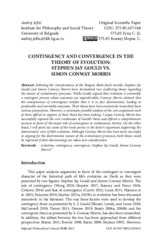Contingency and Convergence in the Theory of Evolution: Stephen Jay Gould vs. Simon Conway Morris
Чланак у часопису (Објављена верзија)
Метаподаци
Приказ свих података о документуАпстракт
Debating the interpretation of the Burgess Shale fossil records, Stephen Jay Gould and Simon Conway Morris have formulated two conflicting theses regarding the nature of evolutionary processes. While Gould argued that evolution is essentially a contingent process whose outcomes are unpredictable, Conway Morris claimed that the omnipresence of convergence testifies that it is in fact deterministic, leading to predictable and inevitable outcomes. Their theses have been extensively researched from various perspectives. However, a systematic parallel analysis of the core arguments each of them offered in support of their thesis has been lacking. I argue Conway Morris has successfully exposed the core weaknesses of Gould’s thesis and offered a comprehensive account in favor of the major role of convergence in evolutionary history. On the other hand, I will point out some of the weak points in the latter’s arguments supporting the
deterministic view of life’s evolution. Although Conway Morr...is has been more successful in arguing for the deterministic nature of the evolutionary processes, both theses could be improved if their shortcomings are taken into consideration.
Кључне речи:
evolution / contingency / convergence / Stephen Jay Gould / Simon Conway MorrisИзвор:
Belgrade Philosophical Annual, 2022, 35, 1, 31-48Издавач:
- Filozofski fakultet Univerziteta u Beogradu
Финансирање / пројекти:
- Министарство науке, технолошког развоја и иновација Републике Србије, институционално финансирање - 200025 (Универзитет у Београду, Институт за филозофију и друштвену теорију) (RS-MESTD-inst-2020-200025)
Колекције
Институција/група
IFDTTY - JOUR AU - Jeftić, Andrej PY - 2022 UR - http://rifdt.instifdt.bg.ac.rs/123456789/2685 AB - Debating the interpretation of the Burgess Shale fossil records, Stephen Jay Gould and Simon Conway Morris have formulated two conflicting theses regarding the nature of evolutionary processes. While Gould argued that evolution is essentially a contingent process whose outcomes are unpredictable, Conway Morris claimed that the omnipresence of convergence testifies that it is in fact deterministic, leading to predictable and inevitable outcomes. Their theses have been extensively researched from various perspectives. However, a systematic parallel analysis of the core arguments each of them offered in support of their thesis has been lacking. I argue Conway Morris has successfully exposed the core weaknesses of Gould’s thesis and offered a comprehensive account in favor of the major role of convergence in evolutionary history. On the other hand, I will point out some of the weak points in the latter’s arguments supporting the deterministic view of life’s evolution. Although Conway Morris has been more successful in arguing for the deterministic nature of the evolutionary processes, both theses could be improved if their shortcomings are taken into consideration. PB - Filozofski fakultet Univerziteta u Beogradu T2 - Belgrade Philosophical Annual T1 - Contingency and Convergence in the Theory of Evolution: Stephen Jay Gould vs. Simon Conway Morris IS - 1 VL - 35 SP - 31 EP - 48 DO - 10.5937/BPA2235031J ER -
@article{
author = "Jeftić, Andrej",
year = "2022",
abstract = "Debating the interpretation of the Burgess Shale fossil records, Stephen Jay Gould and Simon Conway Morris have formulated two conflicting theses regarding the nature of evolutionary processes. While Gould argued that evolution is essentially a contingent process whose outcomes are unpredictable, Conway Morris claimed that the omnipresence of convergence testifies that it is in fact deterministic, leading to predictable and inevitable outcomes. Their theses have been extensively researched from various perspectives. However, a systematic parallel analysis of the core arguments each of them offered in support of their thesis has been lacking. I argue Conway Morris has successfully exposed the core weaknesses of Gould’s thesis and offered a comprehensive account in favor of the major role of convergence in evolutionary history. On the other hand, I will point out some of the weak points in the latter’s arguments supporting the
deterministic view of life’s evolution. Although Conway Morris has been more successful in arguing for the deterministic nature of the evolutionary processes, both theses could be improved if their shortcomings are taken into consideration.",
publisher = "Filozofski fakultet Univerziteta u Beogradu",
journal = "Belgrade Philosophical Annual",
title = "Contingency and Convergence in the Theory of Evolution: Stephen Jay Gould vs. Simon Conway Morris",
number = "1",
volume = "35",
pages = "31-48",
doi = "10.5937/BPA2235031J"
}
Jeftić, A.. (2022). Contingency and Convergence in the Theory of Evolution: Stephen Jay Gould vs. Simon Conway Morris. in Belgrade Philosophical Annual Filozofski fakultet Univerziteta u Beogradu., 35(1), 31-48. https://doi.org/10.5937/BPA2235031J
Jeftić A. Contingency and Convergence in the Theory of Evolution: Stephen Jay Gould vs. Simon Conway Morris. in Belgrade Philosophical Annual. 2022;35(1):31-48. doi:10.5937/BPA2235031J .
Jeftić, Andrej, "Contingency and Convergence in the Theory of Evolution: Stephen Jay Gould vs. Simon Conway Morris" in Belgrade Philosophical Annual, 35, no. 1 (2022):31-48, https://doi.org/10.5937/BPA2235031J . .



